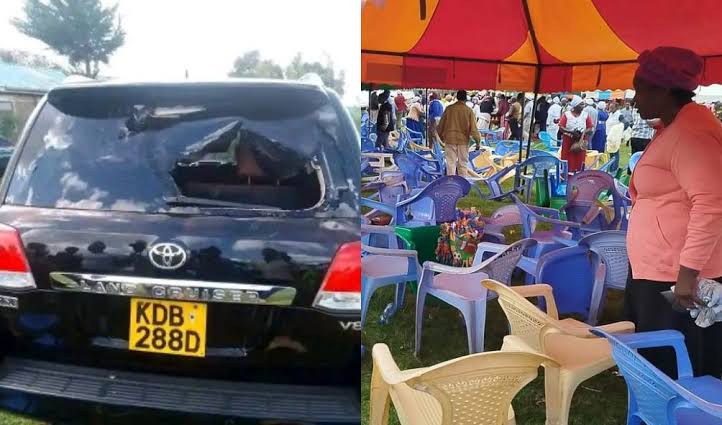In 1997, I actively participated in the campaign of a close friend running for Member of Parliament in the Tinderet constituency. At the peak of the campaign, we were ambushed by a mob that pelted us with stones, struck us with blows, and hurled insults. Our candidate suffered serious injuries, and we scrambled for safety. That violent episode left a lasting impact, with repercussions that still resonate more than twenty-seven years later. Violence has profound and enduring consequences, extending beyond both time and geography. This is precisely why the recent violence in Limuru must be addressed with the gravity it demands.
On Thursday, the solemn sanctity of a burial ceremony in Kiambu County was shattered when chaos erupted. Former Deputy President Rigathi Gachagua was forced to flee from irate hired goons, turning a moment of communal mourning into a scene of violence. Mourners sustained injuries and vehicles were vandalized. Politics aside, pause for a moment to envision this — a gathering initially united in grief and reflection, now disrupted by fear and turmoil, where tears of sorrow abruptly turned into tears of distress.
This incident, shocking as it was, offers an opportunity for all Kenyans to reflect on the values of civility, respect, and the responsibility of leadership in maintaining national cohesion.
As stewards of public trust, political leaders must rise above personal rivalries and work to foster mutual respect. Public spaces, whether burial ceremonies, rallies, or official functions, should remain platforms for unity and constructive discourse, not division and incitement.
Kenya is grappling with significant economic challenges, and the frustrations of ordinary citizens are palpable. Acts of provocation, incitement, or violence by leaders or their supporters risk inflaming these frustrations further.
In the absence of proper conflict resolution and responsible leadership, such tensions could spiral into uncontrolled situations, threatening national peace. This should serve as a warning to leaders: Kenyans demand solutions to their challenges, not actions that exacerbate their struggles.
National unity and stability are paramount, especially as the country navigates tough economic times. Incidents like the one in Limuru serve as stark reminders of the need for dialogue and collaboration across political divides. Stability is a prerequisite for addressing the pressing issues affecting Kenyans, including unemployment, inflation, and poverty. All these issues can only be addressed in a climate of peace.
Leaders must prioritize unity over divisiveness, ensuring that political activities do not detract from the broader goal of national peace and progress. When citizens see leaders working together, it inspires hope and motivates collective efforts toward building a stronger Kenya.
At the heart of the unrest is the economic hardship faced by the majority of Kenyans. According to the Federation of Kenya Employers, the unemployment rate for youth aged between 15and 34 years old is a staggering 67%. Politicians must desist from exploiting their desperation and instead focus on creating economic opportunities for them. That’s one of the main ways of securing and guaranteeing peace in Kenya.
Violence and disorder in any form must be rejected, not only by leaders but by all Kenyans. It is the collective responsibility of citizens to hold leaders accountable while upholding peace and order. Communities must take a stand against such disruptions, ensuring that no individual or group undermines the well-being of the nation.
Despite these challenges, Kenya’s resilience and potential are undeniable. Moments like these not only test us but also offer opportunities for reflection and renewal. This incident in Limuru must act as a wake-up call for everyone — leaders and citizens alike — underscoring that our shared future hinges on mutual respect, civility, and collaboration. Together, we can transform challenges into strength, paving the way for a more united and prosperous Kenya for generations to come.
An African proverbs states, ‘If you want to go fast, go alone, if you want to go far, go together.’ Unity is the way to go. Besides,the style of politics from 27 years ago is outdated. ‘Kenya wajinga waliisha’. Think Green, act green!


